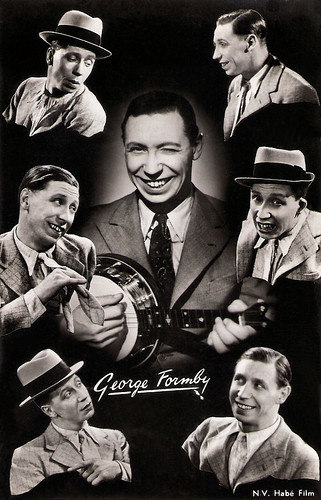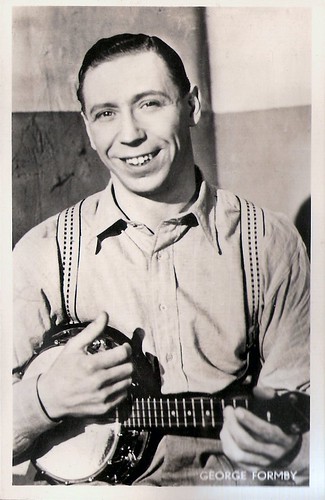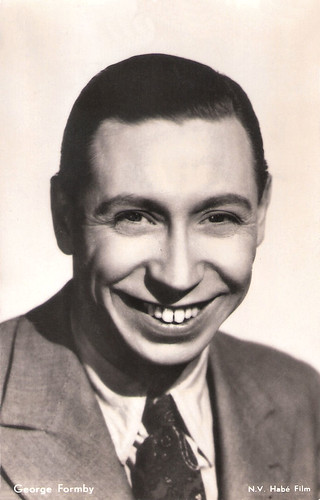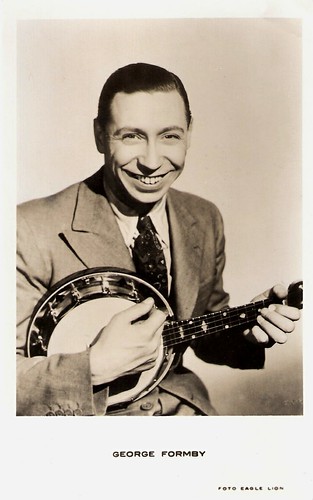George Formby (1904–1961) was Britain's most popular film comedian between 1934 and 1945, and one of the highest-paid stars. He appeared in 21 hit films, cut over 230 records, and entertained an estimated three million Allied Servicemen during World War II. His trademark was the banjo ukulele - along with his buck-toothed grin.

Dutch postcard. Image: N.V. Habé Film.

Dutch postcard by P.F. Cladder, Amsterdam, no. 49-62 kk. Photo: HABÉ Film.

Dutch postcard by M. B. & Z., no. 1080, 1940. Photo: N.V. Habé Film. Publicity still for Keep Your Seats, Please (Monty Banks, 1936).
George Formby was born George Hoy Booth in Wigan, Lancashire, in 1905. He was the eldest of seven children. George was born blind due to an obstructive caul. His sight was restored during a violent coughing fit or sneeze when he was a few months old. His father, George Formby Senior (his real name was James Booth), was a famous stage actor and comedian. He never wanted any of his family to enter show business. George Jr. was apprenticed as a jockey when he was seven and rode his first professional race at ten.
After his father died in 1921, Formby Jr. abandoned his career as a jockey and started his own music hall career using his father's material. In 1924 he married dancer Beryl Ingham, who managed his career until she died in 1960.
He allegedly took up the ukulele, for which he was later famous, as a hobby. He first played it on stage for a bet. In film and on stage, he generally adopted the character of Cheekie-Chappy, an honest, good-hearted but accident-prone innocent who used the phrase: "It's turned out nice again!" as an opening line; "Ooh, mother!" when escaping from trouble; and a timid "Never touched me!" after losing a fistfight.
His unique and often mimicked musical style made him stand out. He sang comic songs, full of double entendre, to his own accompaniment on the ukelele-banjo. He played it in a highly syncopated style, the 'Formby style'.
Some of his songs were considered too rude for broadcasting. His 1937 song, 'With my little stick of Blackpool Rock' was banned by the BBC because of the lyrics, but Formby's cheerful, innocent demeanour and nasal, high-pitched Lancashire accent neutralised the shock value of the lyrics.

British card.

Dutch postcard by Hemo. Photo: Eagle Lion.
George Formby appeared in a sole silent film, By the Shortest of Heads (Bert Haldane, 1915), and in 1934 he made his first sound film Boots! Boots! (Bert Tracy, 1934). The film was successful and he signed a contract to make a further eleven with Associated Talking Pictures, which earned him a then-astronomical income of £100,000 per year.
In his films he played essentially gormless incompetents, aspiring to various kinds of professional success (as cyclist or jockey) and even more improbably to a middle-class girlfriend, usually in the clutches of some caddish type with a moustache. Invariably he scored on both counts, in such films as No Limit (Monty Banks, 1935), Keep Fit (Anthony Kimmins, 1937), and Trouble Brewing (Anthony Kimmins, 1939).
Between 1934 and 1945, Formby was the top comedian in British cinema, and at the height of his film popularity, Let George Do It (Marcel Varnel, 1940) with Phyllis Calvert, was exported to America. This espionage comedy is regarded as his best film. George is a member of a concert party who takes the wrong ship by mistake during a blackout and finds himself in Norway (mistaking Bergen for Blackpool) as a secret agent. A dream sequence in which he punches Adolph Hitler on the nose and addresses him as a 'windbag' is one of the most enduring moments in film comedy.
In the post-war years, the Formbys toured Australia and New Zealand, Scandinavia and Canada, and in 1951 George took the West End by storm in the new musical 'Zip Goes A Million'. A weak heart led to his official retirement in 1952 although he had since occasionally appeared on the stage and in pantomimes.
His final heart attack occurred in 1961 at the home of his fiancée, Patricia Howson, 36. The announcement of their engagement was a surprise just two months after the death of Beryl. An estimated 100,000 mourners lined the route as George Formby's coffin was driven to the cemetery.
George Formby sings 'When I'm Cleaning Windows' in Keep Your Seats, Please (1936). Source: Petey1308 (YouTube).
George Formby sings 'Our Sergeant Major' in It's in the Air (1938). Source: Petey1308 (YouTube).
Sources: Brian McFarlane (Encyclopedia of British Film), BBC, The George Formby Society, Wikipedia, and IMDb.
This post was last updated on 1 April 2024.

Dutch postcard. Image: N.V. Habé Film.

Dutch postcard by P.F. Cladder, Amsterdam, no. 49-62 kk. Photo: HABÉ Film.

Dutch postcard by M. B. & Z., no. 1080, 1940. Photo: N.V. Habé Film. Publicity still for Keep Your Seats, Please (Monty Banks, 1936).
Accident-prone innocent
George Formby was born George Hoy Booth in Wigan, Lancashire, in 1905. He was the eldest of seven children. George was born blind due to an obstructive caul. His sight was restored during a violent coughing fit or sneeze when he was a few months old. His father, George Formby Senior (his real name was James Booth), was a famous stage actor and comedian. He never wanted any of his family to enter show business. George Jr. was apprenticed as a jockey when he was seven and rode his first professional race at ten.
After his father died in 1921, Formby Jr. abandoned his career as a jockey and started his own music hall career using his father's material. In 1924 he married dancer Beryl Ingham, who managed his career until she died in 1960.
He allegedly took up the ukulele, for which he was later famous, as a hobby. He first played it on stage for a bet. In film and on stage, he generally adopted the character of Cheekie-Chappy, an honest, good-hearted but accident-prone innocent who used the phrase: "It's turned out nice again!" as an opening line; "Ooh, mother!" when escaping from trouble; and a timid "Never touched me!" after losing a fistfight.
His unique and often mimicked musical style made him stand out. He sang comic songs, full of double entendre, to his own accompaniment on the ukelele-banjo. He played it in a highly syncopated style, the 'Formby style'.
Some of his songs were considered too rude for broadcasting. His 1937 song, 'With my little stick of Blackpool Rock' was banned by the BBC because of the lyrics, but Formby's cheerful, innocent demeanour and nasal, high-pitched Lancashire accent neutralised the shock value of the lyrics.

British card.

Dutch postcard by Hemo. Photo: Eagle Lion.
Gormless incompetents
George Formby appeared in a sole silent film, By the Shortest of Heads (Bert Haldane, 1915), and in 1934 he made his first sound film Boots! Boots! (Bert Tracy, 1934). The film was successful and he signed a contract to make a further eleven with Associated Talking Pictures, which earned him a then-astronomical income of £100,000 per year.
In his films he played essentially gormless incompetents, aspiring to various kinds of professional success (as cyclist or jockey) and even more improbably to a middle-class girlfriend, usually in the clutches of some caddish type with a moustache. Invariably he scored on both counts, in such films as No Limit (Monty Banks, 1935), Keep Fit (Anthony Kimmins, 1937), and Trouble Brewing (Anthony Kimmins, 1939).
Between 1934 and 1945, Formby was the top comedian in British cinema, and at the height of his film popularity, Let George Do It (Marcel Varnel, 1940) with Phyllis Calvert, was exported to America. This espionage comedy is regarded as his best film. George is a member of a concert party who takes the wrong ship by mistake during a blackout and finds himself in Norway (mistaking Bergen for Blackpool) as a secret agent. A dream sequence in which he punches Adolph Hitler on the nose and addresses him as a 'windbag' is one of the most enduring moments in film comedy.
In the post-war years, the Formbys toured Australia and New Zealand, Scandinavia and Canada, and in 1951 George took the West End by storm in the new musical 'Zip Goes A Million'. A weak heart led to his official retirement in 1952 although he had since occasionally appeared on the stage and in pantomimes.
His final heart attack occurred in 1961 at the home of his fiancée, Patricia Howson, 36. The announcement of their engagement was a surprise just two months after the death of Beryl. An estimated 100,000 mourners lined the route as George Formby's coffin was driven to the cemetery.
George Formby sings 'When I'm Cleaning Windows' in Keep Your Seats, Please (1936). Source: Petey1308 (YouTube).
George Formby sings 'Our Sergeant Major' in It's in the Air (1938). Source: Petey1308 (YouTube).
Sources: Brian McFarlane (Encyclopedia of British Film), BBC, The George Formby Society, Wikipedia, and IMDb.
This post was last updated on 1 April 2024.
No comments:
Post a Comment